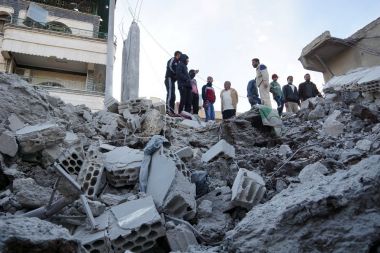Syrian rebels evacuate Homs in victory for Assad
Syrian rebels are evacuating their stronghold of Homs today in a truce deal that will firm up Assad's control of the city.

After a siege for almost three years, the rebels and their families are being moved to insurgent-held areas in north-west Syria near the Turkish border. Once dubbed the "capital of the revolution," Homs will now entirely be under government control.
Witnesses today saw 15 buses leave the area and Homs governor Talal al-Barazi told reporters 300 fighters were on board, together with 400 members of their families.
Barazi said the buses would make a stop in Hama province, where rebels who wished to could disembark, before continuing to Idlib, a province that is a stronghold of insurgents including the al Qaeda-linked Nusra Front.
He described the rebels who left as "militants who reject the agreement", saying they would leave with their families.
"The Waer neighbourhood arrangements will be completely safe and there will be no weapons in Waer after the implementation of the agreement," he said, adding security forces would go back to work in the area and would be the only ones armed.
The deal echoes a local ceasefire agreed in September elsewhere in Syria under which rebel fighters were supposed to be transferred to Idlib, though it has yet to be fully implemented.
Some diplomats say local ceasefires may be the most effective way of gradually bringing peace to a country where more than 250,000 people have been killed. This latest deal follows the peace talks involving world powers in Vienna in October which called for a nationwide ceasefire and a renewal of UN-brokered talks between the rival Syrian sides.
"Our clear goal is to reach as soon as possible a nationwide ceasefire. Meanwhile, initiatives like this one bring relief to besieged or isolated communities and have great value," UN mediator Steffan De Mistura's spokeswoman Jessy Chahine told Reuters.
"They help the perception that a nationwide ceasefire brokered by the members of the ISSG (International Syria Support Group) is doable and that the UN can and will do its part," Chanine added, referring to the Vienna meeting countries.
The previous truce in Homs in 2014 allowed insurgents to withdraw from the Old City while Waer and other areas remained in the hands of insurgents. However this was mainly seen as a forced surrender rather than a deal.
The Syrian Observatory for Human Rights said the Waer deal was better for the rebels than the 2014 agreement because some fighters will stay in the district and the deal will be implemented in stages.
The deal comes after the Syrian army and allied militia launched a major ground offensive north of Homs city. This was preceeded by Russia, Assad's main ally, carrying out air strikes in support of the Syrian military more than two months ago.
Additional reporting by Reuters.











